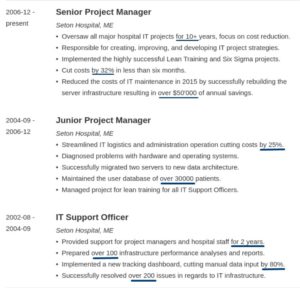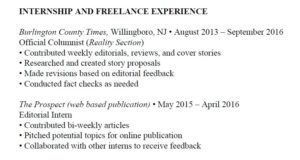The secret of making a resume does not lie in simply demonstrating your qualifications in a favorable light. To create an effective resume, you can use resume writing service or create it by yourself. If you chose the second option you will need to take care of such subtle yet important things as formatting, unity, using specific keywords, tailoring your resume to the desired position, etc. The correct usage of bullet points is also on this list. Resume bullet points are a powerful tool when you know how to use it.
In this article, we will explain how many bullets per job on a resume you need to include, as well as why their number is important. Also, you will learn a few formatting tips that will increase the readability of your bulleted lists. After all, bullet points exist to make your resume message stand out, and this is exactly what you want when writing a resume.
What Are Bullet Points on a Resume
The main function of bulleted lists is to create a readable, concise and informative outline of your qualifications, achievements, skills, responsibilities at your previous positions, etc. Since your resume will be competing for HR-specialist’s attention with dozens or even hundreds of other candidates, you want the best parts of your document stand out. Bullet points make it easier for the recruiter to find what they’re looking for in your resume. This strengthens the chances that they will stop to examine the document carefully instead of throwing it into the refusal pile.
However, you shouldn’t be using the bullet points on a resume just for the sake of it. After catching the attention of the human resources specialist, your bulleted lists need to clearly and quickly answer the question of why you are fit for the job. It is highly recommended to use resume action words and numbers to showcase your achievements.
For instance:
![]() Increased customer base with 45%
Increased customer base with 45%
![]() Trained 10 new employees
Trained 10 new employees
![]() Optimized customer support service
Optimized customer support service
Using powerful action verbs and numbers is not necessary though when listing your responsibilities and tasks. To keep the unity of your messages, avoid mixing tasks and achievements in one bulleted list.
Example of GOOD bullets:

Example of BAD bullets:

To increase the readability of your bullet points, use simple and recognizable bullet symbols like circles or squares. The HR specialists evaluating your resume is interested in the details of your experience, skills, and achievements, not in the extravagance of symbols you use. Also, do not put periods at the end of each bullet point and don’t make the points very long.
Most importantly, the bullet points you list should all contribute to demonstrating your candidature as qualified and suitable for the job. For this reason, it is better to keep your bulleted lists shorter and stronger than to make them lengthy and watery. If some of the points do not amplify the level of your qualification or are not relevant to the position you are applying for, it is better to exclude them.
Does My Resume Have Too Many Bullet Points?
This is the question that might appear when you have a lot to say about your work history in a resume. There is a view that the descriptions of your most recent jobs can be granted more bullets (up to eight) than those at the beginning of your career. However, the attention of the HR specialist might get driven off your resume after reading the 7th bullet point in the list, so we recommend keeping the lists shorter. If you still need more points to be included, you can divide them into subsections, each having a short bulleted list.
How Many Bullet Points Should Be on a Resume
A seemingly simple question “How many bullet points should a resume have?” still causes arguments. The obvious minimum number is two since any list should comprise of at least a pair of points. The maximum numbers rise up to eight. However, we recommend using from three to six points in your bulleted lists to preserve their attention-grabbing qualities. Some say that the lists of three or five points are the most pleasant to the eye and psychologically more effective.
When working on your resume bullet points, remember that quality is far more important here than quantity. Keep your bulleted lists powerful, relevant, and informative, and you will elevate the chances of your resume standing out among competitors.



 (4 votes, average: 4.00 out of 5)
(4 votes, average: 4.00 out of 5)